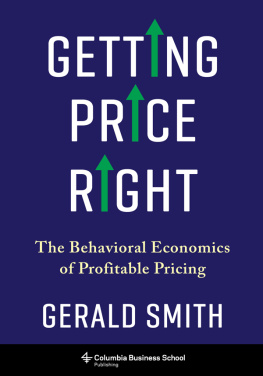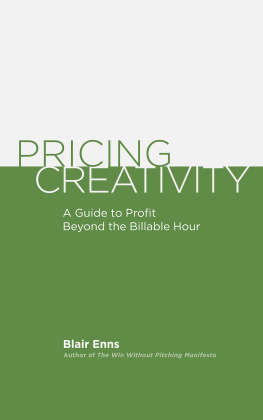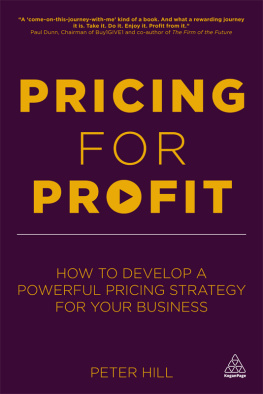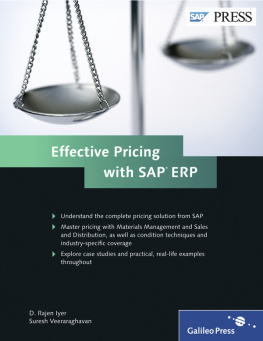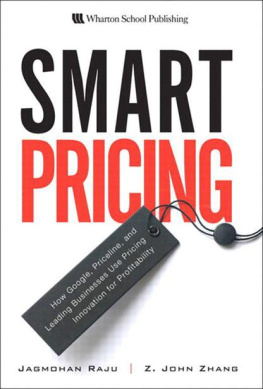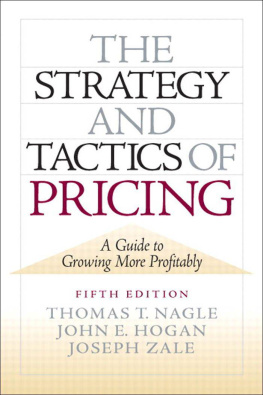palgrave
macmillan
The Future of Pricing
How Airline Ticket Pricing Has Inspired a Revolution
E. Andrew Boyd

The Future of Pricing
This page intentionally left blank
The Future of Pricing
How Airline Ticket Pricing Has Inspired a Revolution
E. Andrew Boyd
palgrave
The Future of Pricing
Copyright E. Andrew Boyd, 2007.
All rights reserved. No part of this book may be used or reproduced in any manner whatsoever without written permission except in the case of brief quotations embodied in critical articles or reviews.
First published in 2007 by PALGRAVE MACMILLAN
175 Fifth Avenue, New York, N.Y. 10010 and Houndmills, Basingstoke, Hampshire, England RG21 6XS.
Companies and representatives throughout the world.
PALGRAVE MACMILLAN is the global academic imprint of the Palgrave Macmillan division of St. Martins Press, LLC and of Palgrave Macmillan Ltd. Macmillan is a registered trademark in the United States, United Kingdom and other countries. Palgrave is a registered trademark in the European Union and other countries.
ISBN-13: 978-0-230-60019-5 ISBN-10: 0-230-60019-0
Library of Congress Cataloging-in-Publication Data
Boyd, E. Andrew.
The future of pricing : how airline ticket pricing has inspired a revolution / E. Andrew Boyd. p. cm.
Includes bibliographical references and index.
ISBN 0-230-60019-0 (alk. paper)
1. AirlinesRates. 2. AirlinesPrices. 3. TransportationTickets. 4. Pricing. I. Title. HE9783.5.B69 2007
387.712dc22 2007003837
A catalogue record of the book is available from the British Library.
Design by Scribe, Inc.
First edition: Novemeber 2007 10 9 8 7 6 5 4 3 2 1
Printed in the United States of America.
For my sister, mother, and father.
This page intentionally left blank
Contents
12 The Coming Revolution 165 Appendix 177 Reference List 179 Index 187
This page intentionally left blank
Acknowledgments
The agents I spoke with while preparing The Future of Pricing wanted me to write either a professional memoir or a guru booka book in which I presented myself as a leading authority on pricing. A memoir was inappropriate because the goal wasnt to tell a story about my professional life. A guru book was out as well. Im not a guru. Im an observer and participant who was fortunate enough to find himself in a fascinating place at a fascinating time. While I like to think Ive made valuable contributions to the field of pricingboth mathematically and manageriallyscientific pricing is the result of the contributions of many different individuals. (I can thank the agents for convincing me that it was okay to use I in a sentence and to share personal experiences.)
I would like to thank every pricing and revenue management professional Ive worked with, conversed with, or read the writings of. Each has contributed to this book in his or her own way. While it would be impossible to list everyone by name, there are a few individuals I would like to recognize explicitly: Chris Anderson, Peter Bell, Peter Belobaba, Bill Cooper, Bob Cross, Renwick Curry, Guillermo Gallego, Tito Homem-de-Mello, Itir Karaesmen, Sherri Kimes, Anton Kleywegt, Warren Lieberman, Jeff McGill, Georgia Perakis, Laura Preslan, Bob Phillips, Richard Ratliff, Rob Shumsky, Barry Smith, Larry Weatherford, and Ciyou Zhu. Special thanks to Karl Isler, Kalyan Talluri, and Garrett van Ryzin, all of whom had a tremendous impact on shaping my thoughts.
Many people contributed to this book by providing information or sitting for an interview. Thanks to Steve Bondi, Bill Brunger, Tom Cook, Neil Corbett, Dave Cripe, Lee Davis, J. D. Dick, Andy Doyle, Bill Dudziak, John Evler, Stacy Foree, Daryn Herrington, Bill Hinke, Phi Hoang, Pete Horner, Jerry Jung, Jeff Kabin, Leon Kinloch, Steve Klein, Vern Lennon, Barry List, Greg Lough, Al Ludwig, Irv Lustig, Steve Macadam, Pat McCord, Chuck McElrea, Denise Minier, Steve Neubert, Graham Parker, Steve Pinchuk, Todd Plage, John Quillinan, Beju Rao, John Riddell, Mike Rothkopf, Mark Shafer, Martin Simoncic, Manny Sousa, Benson Yuen, and Jim Ziminski. Special thanks to
Bob Salter, who provided extensive background material and support throughout the writing process and who, together with Neil Biehn, read early drafts of the manuscript.
Closer to home, Id like to thank the many scientists at PROS past and present, without whom the Science and Research Group could never have evolved to what it is. Thanks, too, to the entire PROS organization. From top to bottom, its a team I enjoy working with and am proud to be part of. Growing a company from a handful of people to one of the three largest software firms in the city of Houston is challenging, but for all the ups and downs, weve managed to keep our humor and maintain a culture in which we care about what we do. As CEO Bert Winemiller puts it, do the right thing. I repeat this often. Thanks, Bert. Thanks, too, to Charlie Murphy for serving as the yin to Berts yang. And special thanks to Ron Woestemeyer and Mariette Melchior. Mariette, you lured me away from an academic career and Im glad you did. Life at PROS has been way too exciting to miss.
Acquisitions editor Aaron Javsicas was a pleasure to work with, and Id like to thank both Aaron and Palgrave Macmillan for providing me with the freedom to write a book that falls somewhat outside the domain of a traditional academic press. Thanks as well to Kate Ankofski, Chris Chappell, Dale Rohrbaugh, Erica Warren, and the entire editorial staff at Palgrave Macmillan for their help and support.
Finally, Id like to thank my son, Alex, and daughter, Katy, who are my constant source of joy. But most of all, I want to thank my wife, Sarah, who has always been there for me. S., life just wouldnt be the same without you.
Preface
Every occupation has its unwritten laws of professional decorum. Having spent eight years as a university student and another ten as a professor, Im familiar with the requirements of general academic writing: third person passive voice, using an idiom familiar to a specialized group, conveying a serious tone. And for my chosen profession, I add the use of mathematics. If an academic researcher wants to advance in their career, there are rules to be followed.
Having now spent more time in business than as a professor, its fair to say that my writing style no longer conforms to academic protocols. Out of necessity and, admittedly, desire, Ive become comfortable with simpler, more straightforward writing, since Ive discovered that its often far more effective at getting your point across. What you give up in precision, you easily make up for in clarity and comprehension. This book strays from academic conventions, but it does so purposefully.
The Future of Pricing is intended to teach, but not through formulas or, in most instances, explicit arguments leading to explicit conclusions. Instead, Ive used interviews, examples, history, and personal experiences to make my case. Theres a carefully thought out thesis, but I intentionally refrained from using the compartmentalized structure found in textbooks and how-to books. I sincerely hope you walk away understanding what incredible changes are taking place in pricing, and for those who are interested, a sense of the marvelous mathematics behind airline ticket pricing. I also hope that you come to better understand the interplay between science, technology, and people in a business setting, and the challenges faced by organizations seeking to integrate science into their pricing. But I also hope you find the book enjoyable, too.
This page intentionally left blank
CHAPTER 1
Next page


